
Breadcrumbs navigation
The latest in IR - autumn book round up
Welcome to our quarterly book round up. Each quarter we bring you updates on the latest International Studies releases by BISA members. To be included in the next update contact Communications Manager, Chrissie Duxson: Chrissie.Duxson@bisa.ac.uk
The International Arms Trade
Reconfiguration of the Defence-Industrial Landscape
Kenneth Boutin
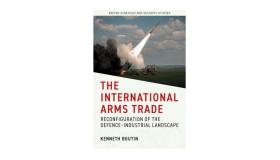
Kenneth Boutin graduated with a PhD in Political Science from York University and served as Senior Arms Control and Disarmament Researcher at the Verification Research, Training and Information Centre. His research interests focus on the political economy of security.
Blurb
The International Arms Trade provides an analytical framework and offers important insights into a system that is experiencing structural transformation. Breaking new ground by situating international arms transfers within the reconfiguration of the global defence-industrial landscape, the book considers the coevolving nature of arms transfer and defence-industrial processes.
Understanding how the arms transfer system is evolving is crucial in light of its impact on the proliferation of conventional arms and on efforts to control the arms trade. The importance of the international arms trade is demonstrated by its contribution to the defence of Ukraine and by increasing concern over the proliferation of advanced arms, a trend in which emerging supplier states feature prominently.
Covering all aspects of arms supply, the book also offers a window onto how the international arms transfer system might look in the near future. This volume is intended for those with a professional or research interest in international security and strategic studies, either in general or in terms of the international arms trade, arms trade control, or defence development issues.
Find out more and purchase the book via the Exeter Press website.
Weaponizing Civilian Protection
Counterinsurgency and Collateral Damage in Afghanistan
Thomas Gregory
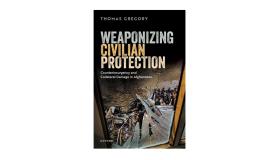
Thomas Gregory is Senior Lecturer in Politics and International Relations at the University of Auckland, New Zealand. His research examines violence against civilians in contemporary conflict, with a specific focus on how civilians are constituted as killable, how civilian casualties are counted, and how civilian casualties are legitimized, rationalized, or excused. His research has appeared in leading academic journals, including International Political Sociology, Review of International Studies, Contemporary Security Policy, and the European Journal of International Relations.
Blurb
Weaponizing Civilian Protection exposes how coalition efforts to minimize and mitigate civilian casualties during the recent conflict in Afghanistan also worked to rationalize the harm inflicted upon Afghan civilians. Drawing on declassified documents and interviews with coalition officials, it traces how civilian protection was reimagined as a martial tactic rather than a humanitarian imperative, with coalition officials reframing civilian casualties as strategic setbacks that could imperil the entire mission.
This book examines the restrictions that coalition officials imposed on combat operations to minimize unnecessary harm to civilians, whilst showing how these restrictions served to constitute civilian casualties as necessary in certain situations, rendering their lives losable and their deaths ungrievable. At the same time, it examines the post-incident mitigation measures coalition officials used to prevent civilian casualties becoming strategic setbacks, including the condolence payments that were offered when civilians were harmed. Rather than seeking to make amends for the harm inflicted upon them, it claims that these post-incident mitigation measures are best characterized as a necropolitical device concerned with managing mortality more effectively. Crucially, Weaponizing Civilian Protection shows that co-opting civilian protection into a martial logic that is more concerned with winning wars than protecting the civilian population works to devalue and dehumanize civilians, leaving them more vulnerable to death and destruction in future conflicts.
Find out more and purchase the book via the Oxford University Press website.
The Politics of Memory Laws
Russia, Ukraine and Beyond
Edited by Uladzislau Belavusau, Aleksandra Gliszczynska-Grabias, Maria Mälksoo, Angelika Nußberger
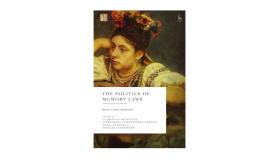
Maria Mälksoo is Professor of International Relations at the University of Copenhagen, Denmark. She is part of the editorial team of BISA journal Review of International Studies.
Blurb
This open access book explores the political utility and consequences of memory laws with a focus on how militant memory laws frame, underpin and generate international conflicts.
Proceeding from Russia's ongoing aggression against Ukraine, this examination plots how memory laws have preceded, partially led to, and encouraged the outbreak of the war itself via Russian propaganda. It also offers a broader perspective looking at developments in the Baltic States, Belarus, Finland, Germany, Hungary, and Poland, as well as in European (Council of Europe and European Union) law. Bringing together scholars with diverse perspectives, this book provides both analysis and conceptual reflection for scholars assessing the politics of memory laws.
Find out more and purchase the book via the Bloomsbury website. It is also available open access as an e-book.
Girls, Power and International Development
Agency and Activism in the Global North and South
Rosie Walters
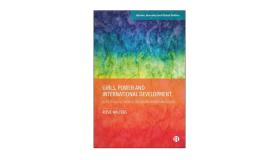
Rosie Walters is Senior Lecturer in International Relations at Cardiff University’s School of Law and Politics with research interests in feminist, poststructuralist and postcolonial approaches to international relations.
Blurb
The United Nations Foundation’s Girl Up campaign has been critiqued for depoliticising global and gender inequalities, portraying girls from the Global South as responsible for lifting entire communities out of poverty and encouraging girls in the Global North to see themselves as the saviours of their Southern counterparts.
Drawing on focus groups with Girl Up members from the UK, US and Malawi, this book demonstrates how girls reflect critically on the Girl Up discourse, reject its individualistic vision of girls’ empowerment and interact with their Northern/Southern counterparts in a spirit of mutual learning and respect. Its analysis demonstrates how the girls use participation in the campaign to develop their own more complex, radical and collective visions of girls’ empowerment.
Find out more and purchase the book via the Bristol University Press website.
Empathy in Politics and Leadership
The Key to Transforming Our World
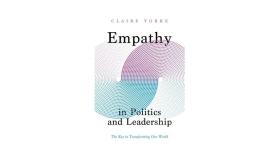
Claire Yorke is senior lecturer at the Centre for Future Defence and National Security at Deakin University, Canberra, where she teaches leaders and public servants from around the world about the importance of empathy. Her research has been widely published in prestigious journals.
Blurb
A timely account of empathy, politics, and leadership, showing how greater understanding and connection can foster trust, community, and innovation
Empathy has become a cliché of contemporary politics, often espoused but rarely understood. Yet the capacity to understand other worldviews is neither easy nor comfortable. Seeing through others’ eyes requires strength, courage, integrity, and an ability to reason across the harshest political divides—and, in a time of heightened marginalization, disconnection, and polarization, empathy in our leaders and across society is vitally important.
Claire Yorke offers the first account of empathy in politics and leadership, drawing on examples from across the world. Including model leaders like Nelson Mandela and Jacinda Ardern, as well as figures on the right such as Donald Trump who mobilize different forms of empathy, Yorke asks what distinguishes empathetic leaders from the rest, and examines why empathy is essential for a more human-centred politics. Demonstrating empathy’s radical potential and disputing its connotations of weakness, this book shows how we can build a political ecosystem that fosters belonging and engagement—and cultivate the necessary dialogue to find common ground.
Find out more and purchase the book via the Yale University Press website.
If you're a BISA member and you'd like your book included in next quarter's round up, email Communications Manager, Chrissie Duxson: Chrissie.Duxson@bisa.ac.uk. Please include the title, blurb and a link to where the book can be purchased. If you are able, you can also include details of any discount available, but of course this is not required. The book should have been published a maximum of six months prior to your email.
Top photo by Phil Hearing on Unsplash